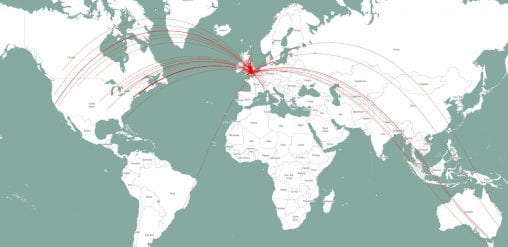Blowing the doors off debt: mapping global interactions of a community project
By Oliver W Duke-Williams, on 27 May 2021
The film Bank Job by Daniel Edelstyn and Hilary Powell is an exploration of the world of credit and of capital creation, and the buying and selling of debt. The film follows a community project in which artists Edelstyn and Powell create their own currency, set up as a bank, and sell bank notes in order to fund the purchase at discount of over a million pounds of debt. The culmination of the film is the cancellation of that debt, both financially (the debt written off) and symbolically, in an exploding van.
Whilst conceived and implemented at a community level in the London Borough of Waltham Forest, it was an undertaking which attracted international interest. The currency created by Powell as hand-printed notes and bonds were bought by a diverse group of people, both individuals and institutions including the V&A Museum, and it was a pleasure to work with the film makers to explore some of the extent of this interest.
The destruction of debt is symbolic, in the sense that £1 million is negligible in the context of total debt levels, yet as described in John Higgs’ The KLF: Chaos, Magic and the Band who Burned a Million Pounds, the million amount is talismanic, and draws attention. Higgs explores further, and argues that whilst run of the mill excess and squandering of money by rock groups is unremarkable and often indulged, the pure destruction of money leaves many incensed.
Is the pure destruction of debt as emotive?
I have known Dan and Hilary for some time (in fact, since Hilary did an installation project at UCL) and was delighted to work with them at the time of the debt destruction to map out the pattern of people who had bought notes and bonds. This poses some questions as a data visualisation – how to present it in an interesting way, but how also to ensure privacy. A web map can be zoomed in to a high level, and mapping locations of purchasers would be disclosive.
A de-identified set of locations was given to me, which were then geo-referenced to give point locations. However, these could still be problematic – some locations were remote settlements with few residents. A random adjustment was made to the location data, with that adjustment larger the further away from the focus point (the bank from which the film-makers worked), as these were more likely to be single, un-clustered cases.
A map was then produced with Great Circle lines linking the (adjusted) locations of purchasers to the Bank Job headquarters in Walthamstow; the result reminiscent of the global scale destination maps in the in-flight magazines of large airlines: one environmentally destructive sector as a metaphor for a documentary about a financially destructive sector.
The majority of notes and bonds were bought locally, and provide, perhaps, a detailed map (not shown) of local supporters of the project. But widening out to UK level, it is clear that it is much more than a local project. Clear clusters of interest around the UK are however visible, in Bristol and Brighton, for example.
For something born at a community level – the faces on the bank notes are those of local community members involved in education, in youth outreach, in food banks and more – this is an impressive global level of interest.
Bank Job – the film
Having had a series of streaming events, it is wonderful to see that the reopening of cinemas means that Bank Job has a physical screening premiere on May 28th at the Empire Walthamstow, which is just a stone’s throw from the former Co-op bank which became Hoe Street Central Bank (HSCB) for the life of the project.
Film premiere: Empire, Walthamstow
Bank Job: details of other screenings
 Close
Close




